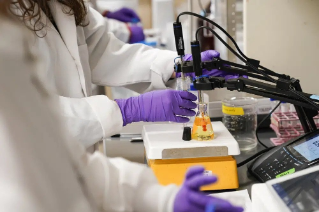
Dangers of forever chemicals
News report shows scientists are getting clearer picture of impact of PFAS
PFAS are known as forever chemicals. They are a large, complex group of synthetic chemicals that have been used in consumer products since the 1950s. Now scientists are getting a clearer picture of just how dangerous these chemicals are.
Per- and poly-fluoroalkyl substances, or PFAS, are used in the aerospace, automotive, construction and electronic industries. These chemicals keep food from sticking and clothes from burning, but scientists said they can also be life-threatening.
PFAS can leak into soil and water, and because they break down slowly, if at all, almost everyone is repeatedly exposed to them.
“They can be found in house dust,” explained Susan Pinney, PhD, professor of epidemiology in the Department of Environmental and Public Health Sciences at the University of Cincinnati College of Medicine. A report on her research recently aired on KPLC-TV in Lake Charles, La.
PFAS can cause increased cholesterol levels, lower immunity and some cancers. Now a new study out of UC shows that exposure to PFAS may impact young girls.
“We found that PFAS delayed the onset of puberty,” said Pinney.
85 percent of the young girls in the study had measurable levels of PFAS in their blood — impacting the same hormones that delay the onset of puberty, which could in turn make these girls more susceptible to breast cancer, infertility and endometriosis.
So, what can anyone do? Use a water filter that removes PFAS, and when possible, opt for products labeled as PFAS-free.
Pinney also suggests getting rid of any old Teflon cookware.
Click here to read the entire report from KPLC-TV.
Featured image at top: Scientists wearing white lab coats and purple rubber gloves use lab equipment in their research. Photo/Provided
Related Stories
Phenols, found in many products, could upset heart's rhythms
October 7, 2024
Chemicals called environmental phenols include food preservatives, plastics ingredients such as BPA and the parabens in shampoos, so they are ubiquitous in everyday life. Now, University of Cincinnati research suggests that higher exposure to phenols might trigger changes in the heart's electrical system and rhythms.
U.S. News & World Report: Metformin may help young patients with bipolar disorder avoid weight gain
October 31, 2023
U.S. News & World Report highlighted recent research led by the University of Cincinnati and Northwell Health that found the drug metformin can help prevent or reduce weight gain in youth taking medication to treat bipolar disorder.
UC researchers significantly shorten drug development time
September 4, 2024
Researchers from the University of Cincinnati College of Medicine and Cincinnati Children’s Hospital have found a new method to increase both speed and success rates in drug discovery. The study, published Aug. 30 in the journal Science Advances, has been featured in several online publications.
